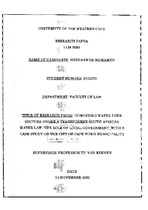| dc.contributor.advisor | Van Reenen, T.P. | |
| dc.contributor.author | Mohamed, Shehaamah | |
| dc.contributor.other | | |
| dc.contributor.other | Faculty of Law | |
| dc.date.accessioned | 2013-06-14T07:12:54Z | |
| dc.date.available | 2007/04/18 08:34 | |
| dc.date.available | 2007/04/18 | |
| dc.date.available | 2013-06-14T07:12:54Z | |
| dc.date.issued | 2003 | |
| dc.identifier.uri | http://hdl.handle.net/11394/1417 | |
| dc.description | Magister Legum - LLM | en_US |
| dc.description.abstract | This thesis attempted to examine the enabling conditions of existing South African water law and its implementation by the appropriate authorities. The Cape Town Municipality's management over water supply and services is included in this study. The research attempted to expose any shortcomings that might be prevalent in the new water law. The water allocation mechanism of the transformed water legislation and the water demands within various competing water user sectors of the community, such as those pertaining to agriculture and industry, was also explored. | en_US |
| dc.language.iso | en | en_US |
| dc.publisher | University of the Western Cape | en_US |
| dc.subject | Law and legislation | en_US |
| dc.subject | South Africa | en_US |
| dc.subject | Water-supply | en_US |
| dc.subject | Municipal government | en_US |
| dc.subject | Cape Town - Case studies | en_US |
| dc.subject | City councils | en_US |
| dc.title | Competing water user sectors under a transformed South African water law: the role of local government, with a case study on the City of Cape Town Municipality | en_US |
| dc.type | Thesis | en_US |
| dc.rights.holder | University of the Western Cape | en_US |
| dc.description.country | South Africa | |

